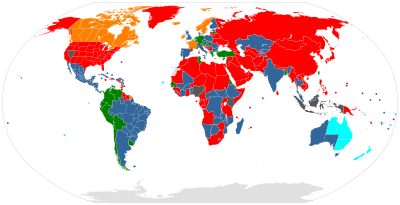
Back قانون البغاء Arabic מעמדה המשפטי של הזנות HE Trattamento legale della prostituzione Italian 성매매 법 Korean

Prostitution laws varies widely from country to country, and between jurisdictions within a country. At one extreme, prostitution or sex work is legal in some places and regarded as a profession, while at the other extreme, it is considered a severe crime punishable by death in some other places.[1] A variety of different legal models exist around the world, including total bans, bans that only target the customer, and laws permitting prostitution but prohibiting organized groups, an example being brothels.[2]
In many jurisdictions, prostitution – the commercial exchange of sex for money, goods, service, or some other benefit agreed upon by the transacting parties – is illegal, while in others it is legal, but surrounding activities, such as soliciting in a public place, operating a brothel, and pimping, may be illegal. In many jurisdictions where prostitution is legal, it is regulated; in others it is unregulated. Where the exchange of sex for money is criminalized, it may be the sex worker (most commonly), the client, or both, who are subject to prosecution.
Prostitution has been condemned as a single form of human rights abuse, and an attack on the dignity and worth of human beings. Other schools of thought argue that sex work is a legitimate occupation, whereby a person trades or exchanges sexual acts for money and/or goods. Some believe that women in developing countries are especially vulnerable to sexual exploitation and human trafficking, while others distinguish this practice from the global sex industry, in which "sex work is done by consenting adults, where the act of selling or buying sexual services is not a violation of human rights."[3] The term "sex work" is used interchangeably with "prostitution" in this article, in accordance with the World Health Organization (WHO 2001; WHO 2005) and the United Nations (UN 2006; UNAIDS 2002).[4]
- ^ "Iran – Facts on Trafficking and Prostitution". Uri.edu. Archived from the original on 8 October 2014. Retrieved 16 January 2012.
- ^ "Criminal Prostitution Law". Just. 2020. Retrieved 1 December 2023.
- ^ "Understanding Sex Work in an Open Society". Open Society Foundations. June 2013. Retrieved 4 January 2014.
- ^ "FAQ". Sex Workers Alliance Ireland. 2014. Archived from the original on 18 January 2014. Retrieved 4 January 2014.
© MMXXIII Rich X Search. We shall prevail. All rights reserved. Rich X Search
